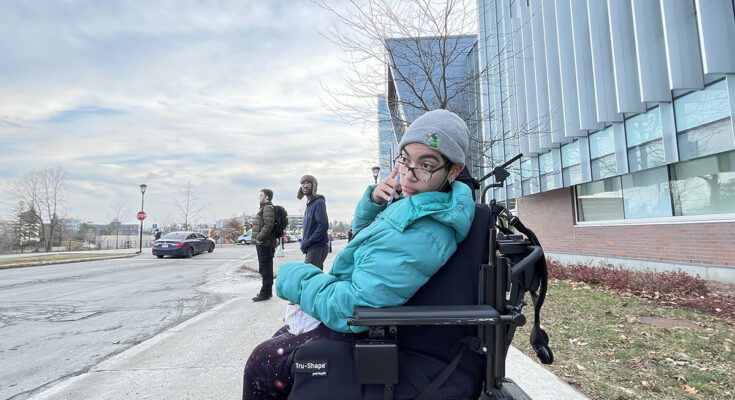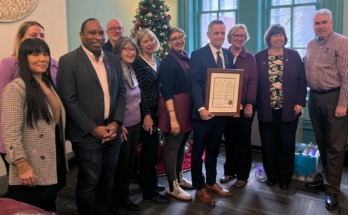A round trip from her home to the grocery store can be a 15-minute car ride, but it often takes Sally Thomas two hours on Para Transpo.
Thomas, a former Paralympian and power-chair user, knows the long travel times all too well. A lot of Para Transpo riders in Ottawa share the feeling. Though the system is designed for Ottawa residents who cannot take conventional transit due to varying disabilities, many riders often feel frustrated over its lack of punctuality, inflexibility and restrictive, outdated booking system.
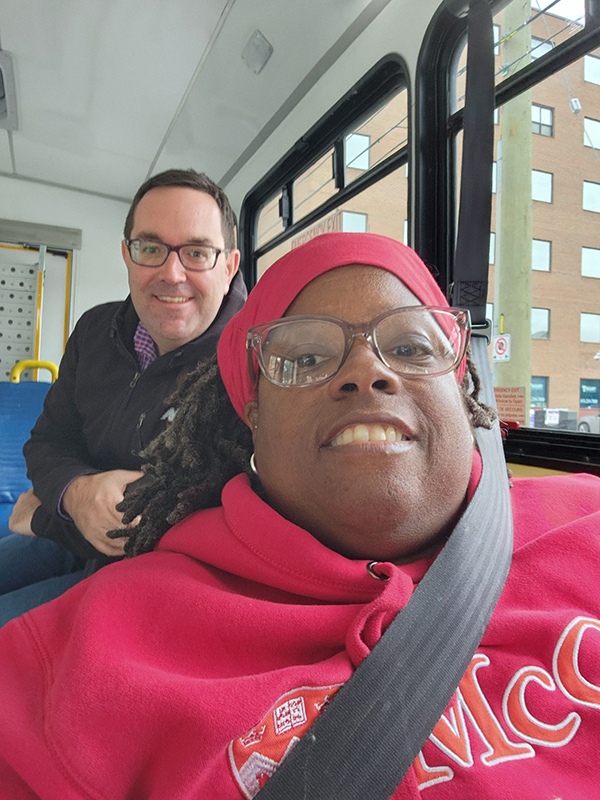
In October, Thomas invited Coun. Glen Gower, the chair of the Transit Commission, to join her in a ride-along to understand how a small errand can be a time-consuming ordeal for Para Transpo riders.
The pair went out to pick up a bottle of distilled water for their test. It took them two hours for a journey that would normally take less than 15 minutes by car, because the transit service does not allow customers to book two trips within a 90-minute window, forcing riders to wait for a return trip after they have finished shopping. Thomas had to book two separate trips.
“After that trip, I contacted OC Transpo staff and I said, ‘What’s the rationale for this? Why can’t you book within a one-hour window?’ I haven’t heard back from them yet,” Gower told The Capital Chill.
The 90-minute waiting period is just one roadblock for Para Transpo riders.
“People in this community say you should be grateful that there is a service. But it’s not much of service. It’s not providing what I need on a regular basis and it’s very inconsistent,” Thomas said.
Punctuality woes
In November, OC Transpo released a report that boasts an on-time performance of over 90 per cent for Para Transpo service in 2023 to date. The satisfaction among riders paints a different picture.
“They are always late,” says Jay Baldwin, a Carleton student who uses Para Transpo every week. They were interviewed while waiting more than 30 minutes for their ride to the pharmacy. OC Transpo would consider the ride only three minutes late because the clock doesn’t start until after the first half hour.
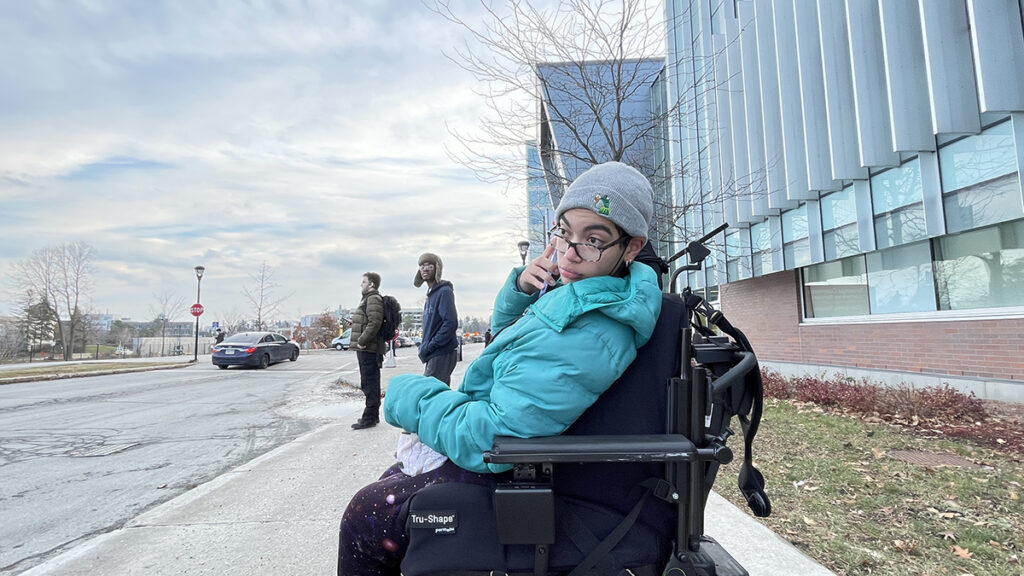
For riders like Baldwin and Thomas, a recurring issue is that their rides may technically meet the company’s criteria for punctuality, but that often does not align with their needs.
“If a person with a disability is 30 minutes late to work as often as Para Transpo is 30 minutes late to pick me up, they would not have a job,” Thomas explained.
Kyle Humphrey is another long-time Para Transpo rider and disability advocate. Para Transpo’s delayed service has put his employment at risk in the past by making him late for work. He says he will take the LRT if he lands an interview during his current job search. “I want to get there on time,” he said.
Long-standing requests for same-day booking unmet
When it comes to providing service for Para Transpo riders, the city has come a long way from when it limited riders to only booking four trips a day. Despite this progress, the reservation-only policy remains a problem for some: riders must book buses at least one day in advance, creating yet another barrier on their journey to independent mobility.
“People with disabilities also need to go to work and school and hang out,” Baldwin said. “But the system considers us as unproductive people who never go out.”
Unlike able-bodied people, Para Transpo users are still routinely excluded from moving spontaneously, whether for work or entertainment.
During the Ottawa Accessibility Advisory committee meeting last month, Humphrey said that he hopes people with disabilities could also have “equity in terms of transit,” which is why he has been pushing for a same-day booking system for more than four years.
For some, the struggle has been even longer. “We’ve been demanding same-day bookings for decades, and it hasn’t happened,” said Jerry Fiori, the former chair of Ottawa Disability Coalition.
Winter brings additional challenges
Para Transpo riders “have major issues year-round, but especially in the wintertime,” Fiori said.
Para Transpo’s application form for registering as a customer says that Ottawa’s conventional transit service “may be a better alternative for those who want greater independence and flexibility.” Some riders do use conventional buses. But in the winter, Para Transpo can be the only option for a lot of them.
Thomas explained that she cannot use conventional buses at all when there’s snow on the ground. She said she cannot get to the bus stop on her power chair “as soon as it snows more than a centimetre,” and only Para Transpo can provide “door-to-door service” helping riders to and from the buses.
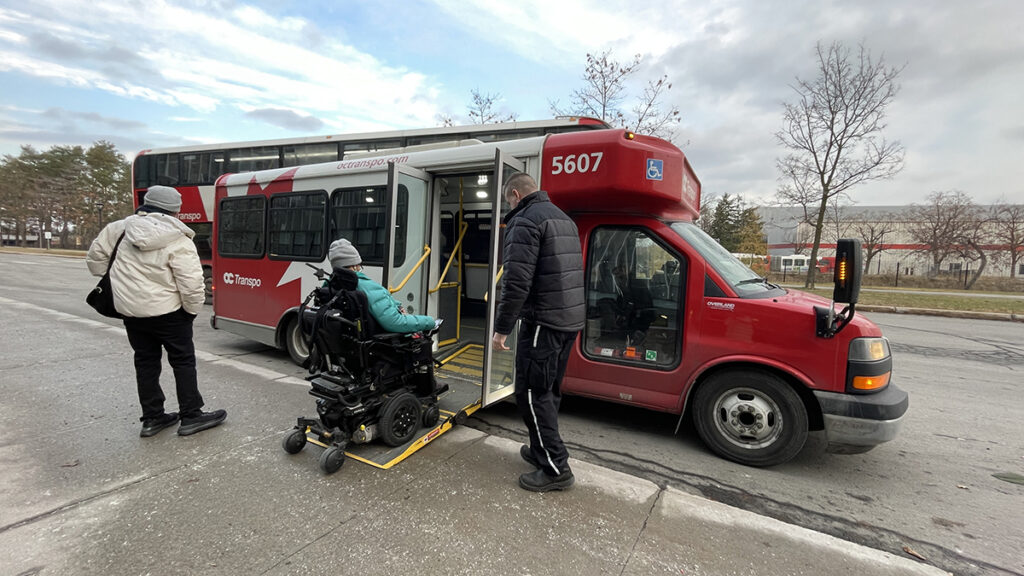
Fiori seconds Thomas’s experience. “Getting about is really difficult when we have more and more snow and ice events,” he says. “And sometimes you cannot actually get out because there are no rides available for you in the wintertime at peak periods.”
Para Transpo could always use more investment
The city is set to spend more than ever before on public transit in 2024. According to the Transit Commission’s 2024 budget plan, $195.9 million is earmarked for “Bus and Para Transpo.” However, the lion’s share of this budget would be spent on the “Zero Emissions Bus Program” for buying new conventional buses, which would cost $179.7 million.
The city is going to increase Para Transpo’s services budget in line with inflation and purchase new Para Transport buses in the next two years, Gower says.
However, the specific budget allotment for Para Transpo is not clear because spending is “buried into other line items,” he says.
“If we roll out same-day booking, you have to make sure you have the resources to provide that service. And in a city as big as Ottawa, that could be a real challenge,” Gower says.
OC Transpo is “studying the feasibility of overnight service, same-day booking,” according to a written statement from Pat Scrimgeour, director of transit customer systems and planning.
Para Transpo riders will persist in their efforts to turn the longstanding study of the issue into a reality.
Humphrey and Thomas have been running a Facebook group named “Let’s Make Ottawa Accessible.” Humphrey says that he wants to include more people in the conversation.
“At the end of the day, this shouldn’t be a battle of ‘us versus them,'” Humphrey says. “This shouldn’t be a battle of ‘LRT versus Para Transpo.’ This should be a battle of ‘Let’s make Ottawa accessible’.”

